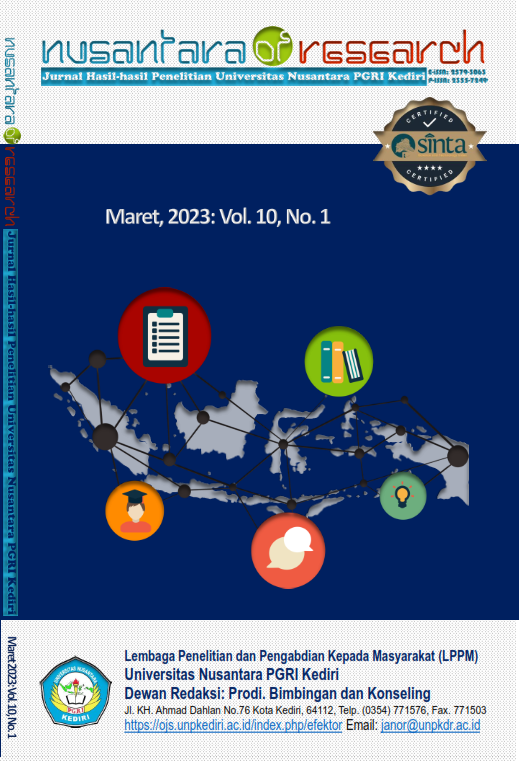The Role of Guidance and Counseling Teachers in Forming Students' Independent Character in the Education Scene
Main Article Content
Abstract
This article aims to describe the role of education in shaping student independence. Education as the spearhead in developing the quality of Human Resources has an important role in developing and improving the quality of a country. The quality of education is not only measured in the academic component but how can guarantee the development of independent students in accordance with the stages of development where one of the main components is student character. This article uses a literature review approach, namely selecting specific sources according to the theme, identifying articles, and then compiling articles. Meanwhile, the data collection technique used is through journals, books, and articles, both national and international, which are related to the subject matter that is the theme of this article. In order to support the study, a small survey was conducted at the school, namely SMA I Lembang Bandung. Education is carried out with the aim of forming not only the academic component of students but also delivering students to be independent as a whole. In forming the independent character of students, it is necessary to have parties who have responsibility and authority such as teachers, parents, and the community. On the other hand, cultural factors which are an integral component of the community structure cannot be separated from influencing the character development factors of independent students. Thus it is necessary to have synergy in building quality Human Resources (HR).
Downloads
Article Details
Issue
Section
Authors who publish with this journal agree to the following terms:
- Copyright on any article is retained by the author(s).
- The author grants the journal, the right of first publication with the work simultaneously licensed under a Creative Commons Attribution License that allows others to share the work with an acknowledgment of the work’s authorship and initial publication in this journal.
- Authors are able to enter into separate, additional contractual arrangements for the non-exclusive distribution of the journal’s published version of the work (e.g., post it to an institutional repository or publish it in a book), with an acknowledgment of its initial publication in this journal.
- Authors are permitted and encouraged to post their work online (e.g., in institutional repositories or on their website) prior to and during the submission process, as it can lead to productive exchanges, as well as earlier and greater citation of published work.
- The article and any associated published material is distributed under the Creative Commons Attribution-ShareAlike 4.0 International License
How to Cite
References
Afrina, Lindayarni (2023). Peran Guru BL dalam Membina Karakter Siswa Setelah Pandemi Covid 19 di MTSN 1 Pasaman. Jurnal kajian Penelitian Pendidikan dan Kebudayaan. Vol. 1 No.1
Baharun, H., & Mahmudah, M. (2018). Konstruksi Pendidikan karakter di Madrasah Bebasis Pesantren. Jurnal mudarrisuna: Media Kajian Pendidikan Agama Islam.8 (1)
Deni Damayanti, (2014) Padnuan Implementasi Pendidikan Karakter di sekolah. Yogyakarta: Araska.
Didit Nantara. 2022. Pembnetukan Karakter Siswa Melalui Kegiatan di Sekolah dan Peran Guru. Jurnal Pendidikan Tambusai. Vol. 6 No 1.
Didih m Sudi, Ahmad Hidayat, Uun Kurniasih, (2023). Penanaman nilai Agama dalam membentuk Siswa Mandiri di SMP Riyadul Mubtadin MAN Dalawangi. Jurnal TA’dibiaya. Vol 3 No 1.
Fadillah Rahmayani (2019) Hubungan antara karakter mandir belajar dengan hasil belajar siswa. Jurnal. JPE (junral pendidikan edutama) Vol 6 No 2.
Facthul, (2012). Pendidikan Karakter, Jogjakarta: Ar_Ruzz Media.
Fitri hajar Punama & Santo Tri Raharjo. 2018. Peran Sekolah dan Perilaku remaja. Prosiding penelitian dan Pengabdian Kepada masyarakat. Vol. 5. No 3.
Hasnadi, (2019). Penerapan Nilai Karakter Melalui Budaya Sekolah. Jurnal Idarah. Vol. 3 No.2.
Hermawan Aksan (2014) Pendidikan karakter. Bandung : Nuansa Cendekia
Jason Metcalfe & Daniel Moulin-Stożek. Religious education teachers’ perspectives on character education, 2020. DOI: 10.1080/01416200.2020.1713049
Johnson, L. M. (2010) Autonomy And Self-Regulation: Enhancing Student Success Through Engagement In The Learning Process. Journal of college rading and learning. 41 (1)
Khansa, dkk. (2020). Analisis Pembentukan Karakter Siswa di SDN Tangerang 5. Jurnal Pendidikan Dasar. 4, (1). 158-179. https://ejournal.stitpn.ac.id/index.php/fondatia
Maryono, Hendra Budiono, Resty Okha (2018). Implementasi Pendidikan Karakter Mandiri di Sekolah Dasar. Jurnal GENTALA Pendidikan Dasar. Vol 3 No. 1. https://doi.org/10.22437/gentala.v3i1.6750
Mohammad Mustari, (2014) Nilai Karakter Relfeksi Untuk Pendidikan. Jakarta. Raja Grafiindo Persada.
Mujiburrahman (2022). Pendidikan Karakter siswa Berbasis Kearifan Lokal di Aceh. Proceedngs ICIS. Vol 1, No 1. ISSN: 978-623-6114-957
Mochammad Irfan Aziz, Ria Fajrin Rizqy Ana (2022). Peran Budaya Sekolah dalam Membangun Karakter Religius Siswa Kelas 5 SDIT Surya Melati Bandung Tulungagung. Jurnal Tanggap. Vol (2) 2. DOI:10.55933/tjripd.v2i2.408.
Muchlas Samawidan Hariyanto, (2012) Pendidikan Karakter. Bandung: Remaja Rosdakarya.
Muh. Hasyim RosyadiHidayatul Mufidah, Nisa’ul Mufaridoh (2022) Manajemen Kurikulum Anak Usia Dini Dalam Menumbuhkan Karakter Mandiri Siswa. JCE. journal of childhood edication. Vol 6 no 1.
https://doi.org/10.30736/jce.v6i1.910
Musfah Jejen (2015) Manajemen Pendidikan, Teori, Kebijakan dan Praktik. Jakarta: Prenada Media Group.
Oktaviani, C. (2015). Peran Budaya Sekolah dalam Peningkatan Kinerja Guru. Jurnal Manajer Pendidikan. 9, (4). 613-617.
R. Syamsul Hadori, (2022). Ekplorasi Karakter Kemandirian Siswa Melalui Kegiatan Ekstrakurikuler: Studi Dalam Konteks Pendidikan. P-SEMART Journal. 10(10)
Perry L. Glanzer, 2010. Did The Moral Education Establishment Kill Character? An Autopsy Of The Death Of Character. Journal moral education. DOI: 10.1080/0305724032000136716
Sari & Kadri, (2018) Pengaruh Model Group Investigaation Terhadap Pengetahuan Konseptual Pada Materi Pokok Suhu Dan Kalor Di Kelas XI SMK Muhammadiyah 8 Medan. Jurnal pendidikan Fisika, 7 (2).
Seyyed Kazem Banihashem, Omid Noroozi & Perry den Brok, Harm JA Biemans Nafiseh (2023) Gramodeling Teachers’ And Student Attiudes, Emotions And Perpeptions In Blended Eduction: Twowards Post Pandemic Education. Elsevier. Journal homepage: www.elsevier.com/locate/ijme
Susanto, A. (2016). Manajemen Peningkatan Kinerja Guru: Konsep, Strategi, dan Implementasinya. Jakarta: Kencana.
Yusutria, (2018). Analisis Mutu Lembaga Pendidikan Berdasarkan manajemen di pondok pesantren Thawalib Padang Sumatra Barat. Ta’dib: Jurnal Pendidikan Islam. 8(2).
Yusrtria, (2019) Aktualisasi Nilai-Nilai Kemandirian Dalam Membentuk Karakter Mandiri Siswa. Jurnal Ta’dib: Junral Pendidikan agama islam. 8(1).
Wibowo, Agus (2012) Manajemen Pendidikan Krakter di Sekolah. Yogyakarta: Pustaka Belajar.




